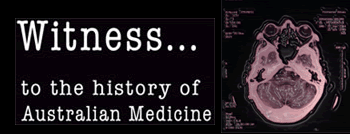


A chapter in the evolution of paediatrics in Australia
Introduction
Participants
Origins of the Department
Early developments
Leadership
New directions in patient care, research and teaching
Ethical issues in research and treatment
Formalising the research effort
Training Programs
Surgical research and training
Finding funds for research
Establishing sub-specialty departments
More on medical education
Academic outreach
Endnotes
Index
Search
Help
Contact us

Ann Westmore: Thank you for that comment Roger because that leads us into one of the issues that comes up quite a lot in historical writings on Vernon Collins' impact, that is his focus on an holistic approach to the welfare and care of children rather than an emphasis on, say, physical or organic aspects of ill-health alone. Is that something that struck those of you who knew him well?
David McCredie: To pick up on something that was said earlier, I think it would be a bit unfair to give the impression that Vernon wasn't interested in research because I think he certainly was. He fostered research and did support a number of projects with a biochemical approach in the 1960s and 1970s and he was responsible for introducing quite a bit of new technology.
Graeme Barnes[61] : Vernon appointed me in 1971, and I think others also, with a whole year's salary in order to do research. So he certainly had a strong sense of supporting it, even though he wasnít directly involved in it himself.
John Rogers: I worked with Vernon in 1968 as a Junior Resident and one of the things he set about doing was to try to teach me how to talk to families and parents. He did this by having me sit in with him at the beginning and then he would brief me and line me up to talk with a family and debrief me at the end of it. He put great focus on the ability to actually be able to handle families and counsel them. He gradually stepped up the difficulty of what he set me to do on my own until in my very last week there he sent me in to see a family whose child had leukaemia.
Bernard Neal: A very quick one sentence about Vernon Collins. He called us together one day - I think it was 1950 - and told us about interviewing parents after the death of a child and acquiring their permission for a post mortem to be carried out. Because up until that time in the old [Children's] Hospital, there was a little notice near the door from the Act of Parliament about permission for autopsy. And it was assumed that the parents had read that and their permission was implied.
Vernon had a talk to us and said, I think the way we've gone about this is rather mean. I remember "mean" was the precise word he used. He said, I donít think thatís good enough. In future, when you see the parents, you must discuss the question of autopsy and you must get their permission. And from that time onwards, autopsies have been done with parental permission.[62] And that was a wonderful example of his foresight and broad care. And so indirectly, of course, all that generation of paediatricians were trained in this ethical question that you shouldnít do things to children without their parentsí permission.
Glenn Bowes: Can I just jump in there. The visionary thing that was referred to earlier is this - that exact piece of teaching of Vernon was picked up last year by Paul Monagle in the national and international debate about autopsy and consent that followed the Bristol and Alder Hey issue in cardiac surgery departments.[63] And Paul Monagle found that quote and used it in his advocacy to State and Federal Governments about the tradition of the autopsy consent process. That's now been codified under the Australian Health Ethics Committee. So, forty years after the event, it had already been forgotten and had to be rediscovered, to remind us of the importance of it.
Frank Oberklaid[64] : Another anecdote about the influence of Vernon Collins. In 1968, while taking ward rounds with Resident Medical Officers, I remember him asking us what medications a child was on. He made us taste the medicine, some of which was foul. That just opened up our eyes. Little things like that had a profound influence.
 |
Witness to the History of Australian Medicine |  |
© The University of Melbourne 2005-16
Published by eScholarship Research Centre, using the Web Academic Resource Publisher
http://witness.esrc.unimelb.edu.au/013.html